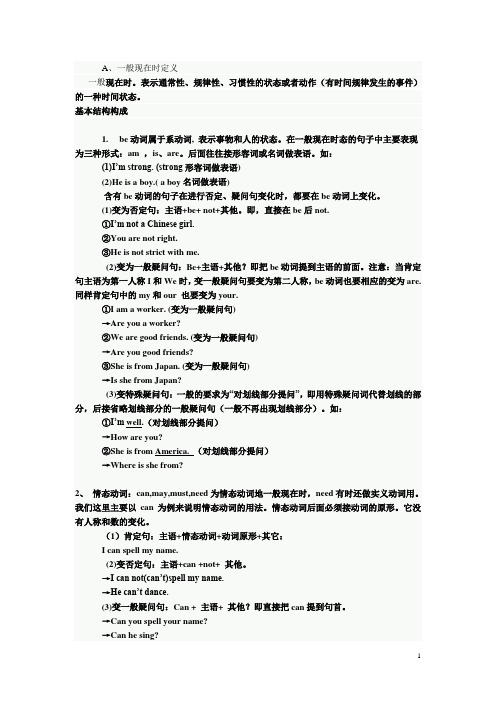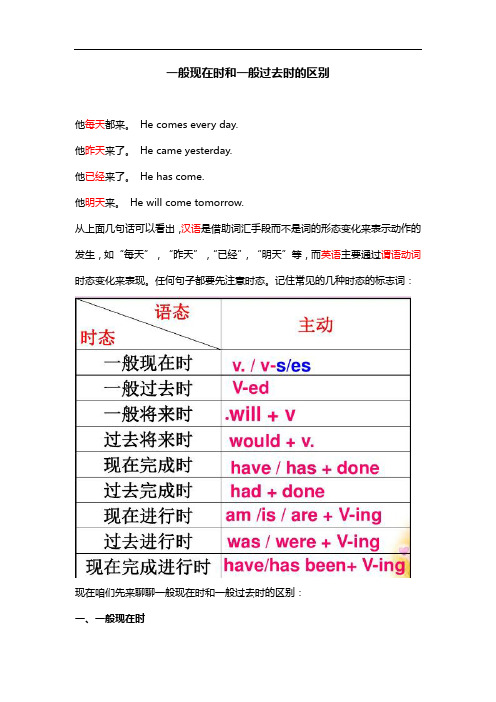一般过去时与一般现在时
一般现在时和一般过去时

一般现在时讲解及练习1、定义与讲解一般现在时:表示经常性的事情,经常性的动作或一般性事实。
时间状语:often 经常,usually通常,always 总是,every+名词每个,sometime s 有时,once a week ,on Sundays ,if 的从句at …在几点钟2. 表示客观真理,科学原理,自然现象,等客观事实或格言,谚语等。
The sun rises in the east and sets in the west every day.The man who has never been to the Great Wall is not a real man.Tomorrow is Tuesday.只有在第三人称单数用动词的“三单变化”,其他用动词的原形。
三单变化:(1)直接在动词词尾加-s.ask---asks work---works get---gets stay---stays(2)以字母s, x, ch, sh或o结尾的动词,在词尾直接加-es.watch---watches wish---wishes fix---fixes pass---passes(3)以“辅音字母加- y”结尾的动词,要先变y为i再加-es.try---tries study---studies cry---cries fly---flies play —plays2.不规则变化:be---- is are have----has do---does go---goes三、一般现在时的句子转换:(1)当句子中有be动词或情态动词时,则把be 动词或情态动词(can,could等等)提到主语的前面变成疑问句;在be动词或情态动词后面加not变成否定句陈述句She is a student.疑问句Is she a student? 否定句She is not a student.陈述句:I can swim.疑问句→ Can you swim否定句→ I can not swim.(2)当句子中即没有be动词,也没有情态动词时,则在主语前加助动词do (you,以及复数), does(单数she,he,it)变成问句;在主语后谓语动词前加助动词don’t(I, you,以及复数), doesn’t(单数she,he,it)变成否定句,助动词后的动词要变成动词原形。
一般现在时和一般过去时讲解及练习

A、一般现在时定义一般现在时。
表示通常性、规律性、习惯性的状态或者动作(有时间规律发生的事件)的一种时间状态。
基本结构构成1. be动词属于系动词, 表示事物和人的状态。
在一般现在时态的句子中主要表现为三种形式:am ,is、are。
后面往往接形容词或名词做表语。
如:(1)I’m strong. (strong形容词做表语)(2)He is a boy.( a boy名词做表语)含有be动词的句子在进行否定、疑问句变化时,都要在be动词上变化。
(1)变为否定句:主语+be+ not+其他。
即,直接在be后not.①I’m not a Chinese girl.②You are not right.③He is not strict with me.(2)变为一般疑问句:Be+主语+其他?即把be动词提到主语的前面。
注意:当肯定句主语为第一人称I和We时,变一般疑问句要变为第二人称,be动词也要相应的变为are.同样肯定句中的my和our 也要变为your.①I am a worker. (变为一般疑问句)→Are you a worker?②We are good friends. (变为一般疑问句)→Are you good friends?③She is from Japan. (变为一般疑问句)→Is she from Japan?(3)变特殊疑问句:一般的要求为“对划线部分提问”,即用特殊疑问词代替划线的部分,后接省略划线部分的一般疑问句(一般不再出现划线部分)。
如:①I’m well.(对划线部分提问)→How are you?②She is from America. (对划线部分提问)→Where is she from?2、情态动词:can,may,must,need为情态动词地一般现在时,need有时还做实义动词用。
我们这里主要以can为例来说明情态动词的用法。
情态动词后面必须接动词的原形。
一般现在时及一般过去时讲义

一般现在时与一般过去时讲义一、一般现在时【No. 1】一般现在时的功能1.表示事物或人物的特征、状态。
如:The sky is blue.天空是蓝色的。
2.表示经常性或习惯性的动作。
如:I get up at six every day.我天天六点起床。
标志性词语:always (一直,总是) often (常常) usually (通常) sometimes(有时) everyday/week/month/year/morning/afternoon/evening/night...3.表示客观现实。
如:The earth goes around the sun.地球绕着太阳转。
【No. 2】一般现在时的构成1. be动词:主语+be(am,is,are) +其它。
如:I am a boy.我是一个男孩。
2.实义动词:主语+实义动词+其它。
如:We study English.我们学习英语。
【注】当主语为第三人称单数(he, she,it)时,要在动词后加"-s"或"-es"。
如:Mary likes Chinese.玛丽喜欢汉语。
【No. 3】一般现在时的变化1.be动词的变化1)否定句:主语be+not +其它。
如:He is not a worker.他不是工人。
2)一般疑问句:Be+主语+其它。
如:-Are you a student? -Yes. I am. / No, I'm not.3)特殊疑问句:疑问词+一般疑问句。
如:Where is my bike?2. 实义动词的变化1)否定句:主语+don't( doesn't ) +动词原形( 其它)。
如:I don't like bread.当主语为第三人称单数时,要用doesn't构成否定句。
如:He doesn't often play.2)一般疑问句:Do( Does ) +主语+动词原形+其它。
一般过去时和一般现在时的知识梳理

一般过去时和一般现在时的知识梳理一般过去时和一般现在时是英语中最基本的两种时态,它们用来描述不同的时间状态。
下面将分别对这两种时态进行详细的梳理。
一、一般过去时1. 一般过去时的基本用法一般过去时用来描述过去某个时间发生的动作或存在的状态,通常和表示过去的时间状语连用,如yesterday(昨天)、last week (上周)、two years ago(两年前)等。
例如:- I went to the park yesterday.(我昨天去了公园。
)- They studied English last night.(他们昨晚学习了英语。
)2. 一般过去时的构成一般过去时的肯定句结构为“主语+ 动词过去式+ 其他”,否定句结构为“主语+ did not + 动词原形+ 其他”,疑问句结构为“Did + 主语 + 动词原形 + 其他”。
例如:- He played basketball with his friends.(他和朋友们打篮球。
)- They did not watch the movie.(他们没有看那部电影。
)- Did you visit your grandparents last weekend?(你上周末去看望你的祖父母了吗?)3. 一般过去时的时间状语一般过去时常常和表示过去的时间状语连用,如yesterday(昨天)、last month(上个月)、in 1999(在1999年)等。
时间状语可以出现在句首、句中或句末。
例如:- Last night, I watched a movie.(昨晚,我看了一部电影。
)- He lived in New York for five years.(他在纽约住了五年。
)二、一般现在时1. 一般现在时的基本用法一般现在时用来描述当前的状态、习惯或经常发生的动作。
它表示的是客观事实或普遍真理,与时间无关。
例如:- The sun rises in the east.(太阳从东方升起。
一般现在时和一般过去时区别

一般现在时和一般过去时的区别他每天都来。
He comes every day.他昨天来了。
He came yesterday.他已经来了。
He has come.他明天来。
He will come tomorrow.从上面几句话可以看出,汉语是借助词汇手段而不是词的形态变化来表示动作的发生,如“每天”,“昨天”,“已经”,“明天”等,而英语主要通过谓语动词时态变化来表现。
任何句子都要先注意时态。
记住常见的几种时态的标志词:现在咱们先来聊聊一般现在时和一般过去时的区别:一、一般现在时概念:经常、反复发生的动作或行为及现在的某种状况。
时间状语:always, usually, often, sometimes, every week (day, year, month...), once a week, on Sundays, etc.基本结构:一般现在时通常是以动词原形表示的,但在主语为第三人称单数时,动词词尾要加-s或-es,规则如下:(1)当动词以-s, -ss, -sh, -ch, -x, -o结尾时,加-es。
如:kiss—kisses wash—washes teach—teaches box—boxes go—goes (2)当动词以“辅音字母+y" 结尾时,改y为i再加-es,如:carry—carries fly—flies try—tries study—studies(3)动词be的一般现在时表现形式是:am, is, are, 根据人称和数的不同而分别采用。
(4)have的第三人称单数形式是has。
(5)除上述情况外,其余动词在词尾加-s。
一般现在时的用法:1、表示客观真理和科学事实、格言以及其他没有时间限制的客观存在。
如:Twice two is four. 2的两倍是4。
The Great Wall is the longest wall in the world. 长城是世界上最长的城墙。
一般现在时与一般过去时

表示在过去某一段时 间里反复出现的动作 或状态。
I used to leave for work at seቤተ መጻሕፍቲ ባይዱen .
注:表示过去反复的动 作或习惯的动作时也 得用would或used to 加动词原形。
3.At that time she spoke english very well.
表示主语过去的特征 或状态、行为等。
用法: 1.表示在过去某一时间里发生的动作或所处的状态。 2.表示在过去某一段时间里反复出现的动作或状态。 3.表示主语过去的特征或状态、行为等。 4.表示在过去某段时间内完成的动作。
1.Where were you just now? 表示在过去某一时间 里发生的动作或所处 的状态。
2.During his middle school years,he played football nearly everyday.
Chinese, Maths, Science and Art at school.
Ⅱ.一般过去时 Simple past tense
1.一般过去常表示过去某一时间所发生的动作或存在的状态。
2.一般过去时常和表示过去的时间状态连用,如a minute ago,yesterday,last
week,in 1900,during the night,in those days等。
Train leaves at eight pm. 动词,后面常接时间状语。)
5.What time is it now? 表示说话时刻的状态或情况。
主语为第三人称时:
Exercises
1.What time_________ his father_________(do) the work?
时态知识点一般现在时一般过去时等
时态知识点一般现在时一般过去时等时态知识点:一般现在时、一般过去时等时态是语法中非常重要的一个概念,用来表达动词所表示的动作或状态在时间上的情况。
一般现在时和一般过去时是时态中最基本的两种,下面将对它们进行详细讨论。
一、一般现在时(Simple Present Tense)一般现在时用来表示经常发生的事件、普遍的真理、现实存在的状态或习惯等。
1. 表示经常发生的事件:例如:- I usually have breakfast at 7 am.- They often go to the park on weekends.2. 表示现实存在的状态或习惯:例如:- The sun rises in the east.- I watch TV every evening.3. 表示普遍的真理或科学事实:例如:- Water boils at 100 degrees Celsius.- The earth revolves around the sun.4. 表示感觉、看法、经验等个人态度:例如:- I love chocolate.- She hates spiders.注意事项:- 在第三人称单数形式中,动词要加上"-s"或"-es"。
- 对于一些规则动词,如work、study等,第三人称单数形式只需要加上"-s"。
- 对于以辅音字母加"y"结尾的动词,要将"y"改为"i"并加上"-es";对于以元音字母加"y"结尾的动词,直接加上"-s"。
二、一般过去时(Simple Past Tense)一般过去时用来表示过去发生的动作或状态,常常与具体的时间状语连用,如yesterday、last week等。
1. 表示过去发生的事件:例如:- I visited my grandparents last weekend.- They watched a movie together yesterday.2. 表示过去的习惯或状态:例如:- He used to live in New York.- She had a pet dog when she was a child.3. 表示过去的真理、科学事实或历史事件:例如:- The dinosaurs became extinct millions of years ago.- Columbus discovered America in 1492.4. 表示间接引语中的陈述句:例如:- He said he loved her.注意事项:- 对于大多数动词,我们只需要在动词原形的基础上加上"-ed"。
一般现在时,与一般过去时
借 对了!我可以 一个助动词do
DDido they buy any milk?
过去式转移到第一个动词
否定句
He wwoorkrekds in the city.
He dodiedns’tn’t work in the city.
在过去时态里,动词只有一种 过去式 形式。
特殊疑问句
does
原形 过去式
一般现在时:事实,实际 情况(大实话,大白话); 习惯,经常
This is a tree.
We have some classes every day.
特殊疑问词+did+主语+动原+ 其它?
Why did he go home?
时 态
一 般 现 在 时 一般过去时
第三人 不是第三 无论主语是第
主 语
称单数 人称单数
he ,she 形式
,it ,
we,you,
几人称,也不 管数量是多少
Kate they
(1个,1万个)
动
第三人 称单数
词 形式
is has
一般现在时
与
一般过去时
在同一种句子中,二者 在句子成分的顺序, 语序上没有区别。所 不同的是一般现在时 变为一般过去时,只 要把动词由原形或第 三人称单数形式变为 过去式
I wamasat home .
一般现过去在时
规律:一般现在时变为一 般过去时,变化的是:am was 其余的 不变
sHhe wisaslate.
一般现过去在 时
一般现在时变为一般过去时
,只要把 is wa,s 其余的
不变
TYWhoeeuy awreere from Shandong.
一般现在时和一般过去式的相同和不同点
一般现在时和一般过去式的相同和不同点一般现在时和一般过去时的相同和不同英语中做谓语的动词基本就两类:1.句子中有Be动词也就是系动词,构成主系表结构表示一种存在的状态。
2.实义动词(具有实际动作意义的词)做谓语,构成主谓宾结构相同之处:1:用法的相同之处:都是表示发生的动作或存在的状态。
2:结构的相同之处:都具有主+系(be动词)+表和主+谓(实义动词)+宾两种结构不同之处:1:用法不同:一般现在时:表示经常反复发生、习惯性的动作或存在的状态(简单理解为每天会重复发生的动作或存在的状态)(请注意:动作和状态)动作表示动词用的是实意动词(do/does);状态表示动词用的是系动词(am、is、are)一般过去时:表示过去的某个时间段内发生的或经常习惯性的动作或存在的状态(请注意:动作和状态)动作表示动词用的是实意动词(did);状态表示动词用的是系动词(was/were)2:结构不同:(含有be动词)主(S)+系动词(be)+表(P)一般现在时:主系表结构(am/is/are)中:1.肯定句中:主+be动词(am/is/are)+表语部分Eg:You are my students She is pretty He is fat2.否定句中: 主+be动词+not+表语部分eg:You are not my students She is not pretty He is not fat3.一般疑问句中: Be动词(am/is/are)+主语+表语Eg:Are you my students? Is she pretty? Is he fat?一般过去时:主系表结构(was/were)中:1.肯定句:主语+was/were+其他2.否定句:主语+wasn’t/weren’t+其他3.一般疑问句:Was/Were+主语+其他?(含有实义动词)主(S)+谓(V)+宾(O)一般现在时结构:1.肯定句:主+谓语动词(do/does)+宾语部分(主语是第三人称单数时动词需+s)eg:you have a baseball / they have a baseball /she has a baseball2.否定句中: 主+do not+谓语动词原形+宾语部分单三人称做主语时+does noteg:you do not have a .../they do not have a .../she does not have ..3.一般疑问句:Do(实意动词)+主语+动词原形+其他注:(单三人称做主语时用Does+主+动词原形+其他)一般过去时结构:1.肯定句:主语+动词过去式(did)+其他2.否定句:主语+didn’t +动词原形+其他3.一般疑问句:Did+主语+动词原形+其他?3:时间状语标志词不同:一般现在时:(标志词)时间状语:always(总是)usually(通常)often(经常)never(从来都不)once a week(每周一次)everyday(每天) on Sunday(在周日),看到这些词时,时态首选一般现在时一般过去时:(标志词)时间状语:初高中英语李老师:153****2703(同微)Yesterday(昨天), just now(刚刚), ago(以前), last week(year, night, month…)这里面有两种情况4句话需要大家牢记,这4句话适用于所有时态第1种情况,当句子中含有实意动词时1含有实意动词的句子变否定句时找对应的助动词(do did does等)在助动词后加not,把实意动词还原为原型其他成分不变2含有实意动词的句子变一般疑问句找对应的助动词,把助动词提前大写,实意动词还原为原形,后面打问号第2种情况句子中含有系动词(am is are was were等)3当句子中含有系动词时,变否定句在系动词后加not即可4当剧中含有系动词时变一般疑问句把系动词提到句前大写,后面打问号。
一般过去时和一般现在时的区别
一般过去时和一般现在时的区别一般过去时(simple past tense)表示过去某个时间里发生的动作或状态;过去习惯性、经常性的动作、行为;过去主语所具备的能力和性格。
时间状语Ago(two hours ago, yesterday, the day before yesterday, last week, last(year, night, month…), 具体时间, just now,at the age of , one day, long ago, once upon a time(很久以前), and so on.(填时间如:two days)ago动词变化规则规则变化:1.直接加ed:work-- worked ,2.以e结尾的单词,直接加d:live --lived3 以辅音字母+y结尾的,变y为i加ed:study studied4以元音字母+y结尾的,直接加ed:enjoy enjoyed5 以重读闭音节结尾的,双写最后的辅音字母+ed:stop stopped不规则变化:have/has -- had, eat--ate, see—saw,am/is—was,are--were, go—went, do--did,take--took, run--ran,lend--lent, sleep--slept, get—got, meet—met, bring—brought, buy—bought, think—thought, say—said, give—gave, put—put, write--wrote, swim--swam基本结构主语+动词过去式+其他否定形式①was/were+not;②在行为动词前加didn't,同时还原行为动词一般疑问句Did+主语+do+其他?例句She often came to help us in those days.I didn't know you were so busy.一般现在时:表示经常发生的动作或存在的状态,一般情况下在动词后加“s”或“es”。
- 1、下载文档前请自行甄别文档内容的完整性,平台不提供额外的编辑、内容补充、找答案等附加服务。
- 2、"仅部分预览"的文档,不可在线预览部分如存在完整性等问题,可反馈申请退款(可完整预览的文档不适用该条件!)。
- 3、如文档侵犯您的权益,请联系客服反馈,我们会尽快为您处理(人工客服工作时间:9:00-18:30)。
…
1. ---What does your father do? --- He __i_s__ a writer. 2. It _w__a_s _ Monday yesterday. And today __i_s__ Tuesday. 3. Physics _w__a_s_ my favorite subject, but now I like politics best.
时 now 间 at the moment 状 these days 这些天 语 today
…
yesterday (morning / …) the day before yesterday 前天
just now 刚才 last week 上星期 two hours ago 两个小时之前
in 2005
---They _w_e_r_e_ born in Heyuan.
4. _W__e_re_ Lily and Sally on the playground an hour ago? 5. I w__a_s_n_’tat home yesterday afternoon. I __w_a_s_ at school. 6. Mother’s Day __i_s__ on the second Sunday of May. 7. May 12, 2013 _w__a_s_ Mother’s Day. 8. ---Where _w_e_r_e_ you just now? ---I __w_a_s_ in the office. 9. There __w_a_s_ a tall tree in front of my house last year. 10. ---Where _w__er_e_ your parents born?
一般现在时 VS 一般过去时
一般现在时
含 义Βιβλιοθήκη 1.现在存在的状态一般过去时
1.过去存在的状态
结 构
主语+
am
/
is
/
are
+
表语
主语+ was / were + 表语
I am happy today.
I was sad last Saturday.
例 Ms He is a teacher now. Ms He was a student in 1995. 句 You are 14 years old. You were 13 years old a year ago.
